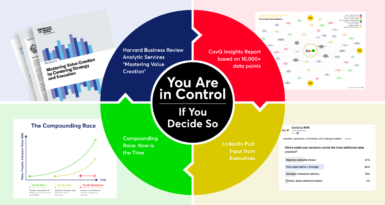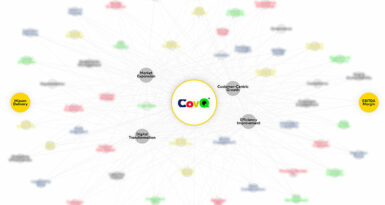
In today’s dynamic and highly competitive business landscape, organizations must navigate through complex challenges to stay ahead. Strategic planning and value creation play pivotal roles in achieving sustainable growth and maintaining a competitive edge. However, the success of these initiatives often hinges on the ability to translate strategies into actionable plans and effectively execute them on an ongoing basis. This is when and where ‘the rubber hits the road’ – the critical juncture where strategic intent meets real-world implementation – or in other words the operating system of a company.
Understanding Strategic Planning
Strategic planning is the process of defining an organization’s long-term goals to deliver on the mission or purpose and developing roadmaps with tactics, milestones, and action items to achieve them. It involves analyzing the internal and external environment, identifying opportunities and threats, and formulating strategies to capitalize on powers and opportunities as well as mitigate issues and risks. Strategic planning provides a clear direction and aligns the collaborative efforts of all stakeholders toward common objectives.
The Value Creation Imperative
Value creation lies at the heart of every successful business. It refers to the process of generating superior value for customers, shareholders, employees, and other stakeholders. By identifying and satisfying customer needs more effectively than competitors, organizations can capture market share and drive profitability. Value creation encompasses various dimensions, such as strategic positioning, product innovation, operational efficiency, customer experience, and brand equity just to name a few, however, a company’s qualitative attributes to accomplish all those are the real key to success and therefore need to be defined, measured and developed, too. This can be reflected in a company’s corporate IQ and DNA, which in contrast to people can be developed to evolve and enjoy the benefits of compounding over time.
The Link Between Strategic Planning and Value Creation
Strategic planning serves as the foundation for value creation. It provides the overarching framework within which organizations can identify and prioritize value-creating opportunities. Most importantly assessing and evaluating the always current status quo of the business is the basis for setting the most relevant and clear strategic goals, organizations can align their resources and efforts toward activities that deliver the highest impact. Moreover, strategic planning helps organizations anticipate market trends, emerging technologies, and changing customer preferences, enabling them to proactively position themselves for value creation in the long term.
Challenges in Execution
Despite the best-laid plans, execution remains a significant challenge for organizations due to the lack of cohesive infrastructure supporting these processes across an organization and being side-tracked easily in the always volatile times. Many well-crafted strategies fail to materialize due to poor execution. Common pitfalls include a lack of alignment between strategy and operations, insufficient resources or capabilities, inadequate communication, and resistance to change. Execution requires strong leadership, effective communication, and a robust implementation framework infrastructure accessible by all relevant employees at any time at any place to ensure that strategies are translated into tangible actions and completion of those.
Best Practices for Effective Execution
To bridge the gap between strategic planning and value creation, organizations should adopt several best practices supported by a central tool or platform:
- Clear Communication: Ensure that strategic goals and plans are effectively communicated throughout the organization. This promotes alignment, encourages employee engagement, and fosters a shared sense of purpose.
- Resource Allocation: Allocate resources strategically to initiatives that have the highest potential for value creation. Prioritize investments based on their anticipated impact and align resource allocation with the organization’s strategic objectives.
- Performance Measurement: Establish not only key performance indicators but also value driver metrics to track progress and evaluate the success of value creation initiatives. Regularly review and adjust performance measures to ensure they remain relevant and aligned with strategic goals.
- Agility and Adaptability: Remain agile and adaptable in the face of changing market dynamics. Continuous monitoring of the external and internal environment and timely adjustments to strategies and plans are crucial to stay ahead of the competition.
- Employee Empowerment: Engage, empower, and inspire all employees at all levels to contribute to value creation efforts. Encourage a culture of innovation, collaboration, and continuous improvement, where employees feel empowered to take ownership of their work and contribute to the organization’s success.
- Value Creation and Strategic Planning Infrastructure: Organizations need to equip themselves with cohesive tools and consistent data to cut through complexity so that they can identify upsides, eliminate downsides and ensure all winning strategies are delivering on the mission, are integrated, tracked, supported as needed and completed cycle after cycle.
Further Considerations
Strategic planning and value creation are inseparable in today’s business landscape. Organizations must go beyond developing strategies and focus on effectively executing them to deliver tangible results. By bridging the gap between strategy and execution, organizations can maximize their potential for value creation, gain a competitive advantage, and achieve long-term success.
To succeed in this endeavor, a 360-degree perspective and data-driven approach are essential. A 360-degree perspective involves considering all relevant aspects of the business ecosystem, including internal capabilities, customer needs, market trends, competitive landscape, and regulatory influences. By gaining a comprehensive understanding of these factors, organizations can make informed decisions and identify untapped opportunities for value creation.
Data plays a crucial role in strategic planning and value creation. It provides organizations with valuable insights, enabling them to make data-driven decisions and track progress effectively. By leveraging data analytics, organizations can identify patterns, trends, and correlations, which can inform their strategies and help them make informed adjustments as needed. Moreover, data-driven decision-making reduces guesswork and increases the likelihood of success by enabling organizations to base their actions on empirical evidence.
In addition to a 360-degree perspective and data-driven approach, applying best-in-class software together with best practices is vital to support the processes of strategic planning and value creation. Technology plays a pivotal role in streamlining and enhancing these processes. Smart software solutions provide robust features and functionalities to capture, analyze, and visualize data, facilitate collaboration, and automate tasks. They enable organizations to centralize strategic planning efforts, track progress, and align various initiatives seamlessly. With intuitive interfaces and dashboards, these software solutions empower decision-makers with real-time insights, enabling them to make timely and informed decisions.
By embracing such software or operating systems, organizations can enhance the efficiency, effectiveness, and agility of their strategic planning and value creation efforts. It ensures that these processes are not merely static documents but living, dynamic systems that can adapt and respond to the changing business landscape. Through the utilization of technology, organizations can harness the power of data, streamline processes, and foster collaboration, ultimately enabling them to create and deliver value more effectively and consistently, which also means reducing risk and saving money.
Conclusion
Where and when the rubber hits the road in strategic planning and value creation, lies in the operating system that organizations adopt and live, giving them a 360-degree perspective, corporate IQ and DNA development platform, leveraging data effectively, and harnessing the capabilities of best-in-class software to manage communication, alignment, and the execution processes. By combining strategic foresight, execution excellence, data-driven insights, and cutting-edge technology, organizations can navigate uncertainties, seize opportunities, and create sustainable value that drives their long-term success and let them keep compounding.




